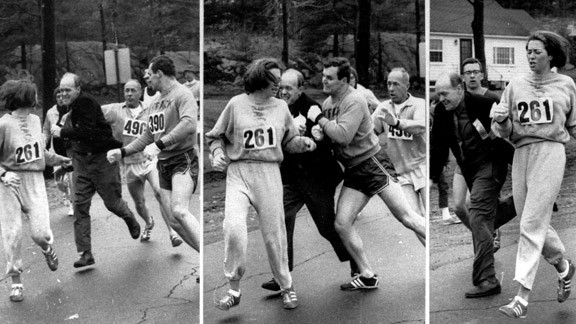If you don't know the meaning behind these iconic photos, read on. From ESPN:
Forty-five years ago, Switzer ran the race for the first time and tried to keep a low profile. When officials noticed a woman in the race, they launched an ugly attack -- which today is one of the most famous moments in the race's 115-year history -- to get her off the course.Read more about Katherine Switzer at ESPN
Switzer, at the time a 19-year-old journalism major at Syracuse University, simply loved running. She had trained for months, even completing a 30-miler, to be sure she could finish. She and her coach, Arnie Briggs, had checked to see whether there were any rules prohibiting women from entering. There weren't; in those days, the idea of women running the 26.2-mile distance was so foreign, the rulebook made no mention of them. So she entered the race using her initials, K.V. Switzer, as was her habit, and was issued No. 261.
Switzer, her boyfriend, Tom Miller, and Briggs were two miles into the marathon when officials tried to evict her from the course. Their tactics were terrifying. In a rage, race director Jock Semple came lunging at her. He got his hands on her shoulders and screamed "Give me those numbers and get the hell out of my race!" The wild look in his eyes still haunts Switzer. "Seeing that face scared the s--- out of me," she said.
In the coming years, Switzer graduated from Syracuse, married Miller (and later divorced him), earned a master's degree and returned to run in Boston when women were officially welcomed in 1972, the same year Title IX became law. Over the next decade, Switzer made good on the promise she forged to herself during the late miles of the 1967 Boston Marathon, to create running opportunities for women.
The 1967 Boston skirmish helped put women runners on the map, but it was Switzer's years of legwork afterward that led the International Olympic Committee (IOC) to add a women's marathon to the Games' program.
To all the women who are running at Boston today, and all the women running in marathons, half-marathons, 10ks, and 5ks around the world and calendar, good luck! Whoever thought that women wouldn't be physically capable of running long distances have - thankfully - been proven absolutely, totally, irrevocably wrong. (I imagine that the increased presence of women in such grueling events has also lead to changing how we have thought about early humans and pre-human capabilities, but I don't have proof of that.)

No comments:
Post a Comment